Category Archive: Epoxy Coatings & Joint Filler
At Copps Industries, we believe in the power of innovation. It’s evident in our products and our commitment to nurturing the next generation of chemists, developers, and engineers.
For years, we’ve taken steps to advance the industry by partnering with universities and research institutions across the nation. We’ve reaffirmed our dedication to student and industry development one project at a time.
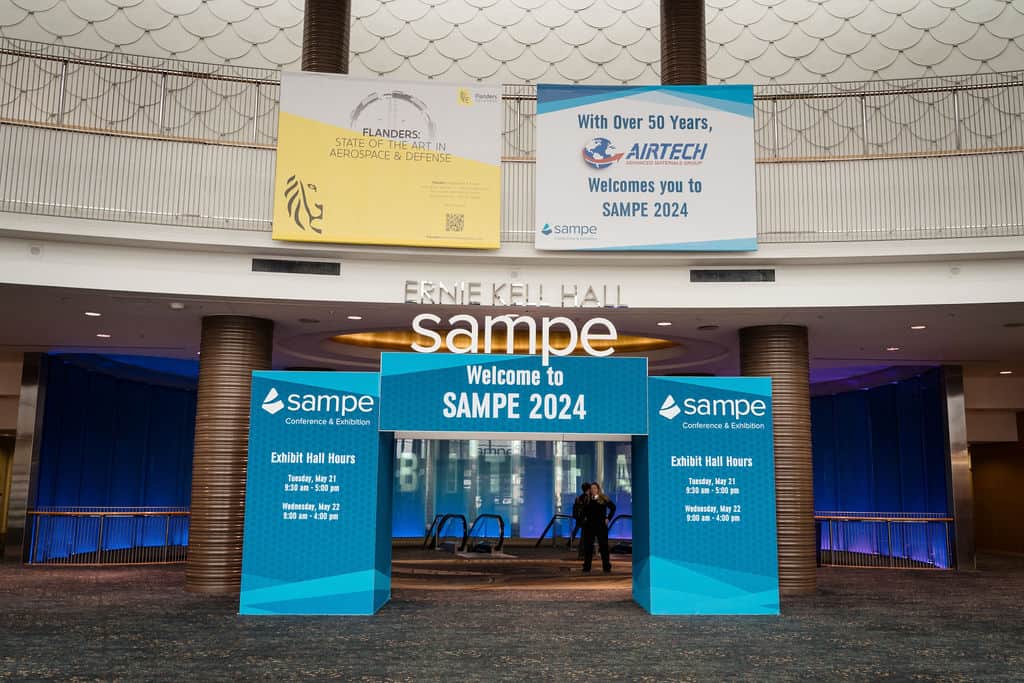
Fostering Innovation Through Partnership
Supporting transformative projects at the collegiate level is one of our top priorities—and a strategic imperative. By partnering with institutions like Oak Ridge National Laboratory, the University of California—Berkeley, and others, we’re doing our part to revolutionize industry standards and practices.
These collaborations are about more than just research; they’re about making real-world impacts. For instance, we’ve worked with Oak Ridge National Laboratory on cutting-edge research to help make carbon fiber technologies more accessible for use in industries like automotive, wind energy, and infrastructure. And our partnership with UC Berkeley’s Formula SAE team showcases our commitment to students who embody the innovative spirit we strive to support.
Copps Industries also closely partners with SAMPE, the Society for the Advancement of Material and Process Engineering. SAMPE connects professionals in the field to exchange insights and ideas on new materials and processing technology and often supports student-led student projects and competitions. Members of the Copps team actively participate with SAMPE to facilitate industry connections and provide resources for research and development.
Copps’ Epoxy Resins in Collegiate Competitions
Our involvement with the UC Berkeley Formula SAE team has been particularly exciting. The Berkeley Formula Racing team is composed of a diverse group of students from various disciplines, including mechanical engineering, electrical engineering, and business. This year, the team is developing a formula-style, single-seat race car from scratch, intended for the Formula SAE Electric competition at Michigan International Speedway in June.


Copps Industries has supported the team’s project by providing state-of-the-art epoxy resins essential for crafting key components of their race car. Advanced materials and processes play a crucial role in the Formula SAE competition. Our experts have worked closely with the students, advising them on the best resin systems and processes to optimize the performance and reliability of their car.
Impact Beyond the Lab
The support we provide to students extends beyond materials and advice. By investing in these future leaders, we’re helping to foster a culture of innovation they carry forward as they enter their careers.
It’s a story we’ve seen play out many times over. One example is a former student from Knoxville, Tennessee, who, after collaborating with Copps Industries on a university project, went on to start his own company. His familiarity with Copps and our capabilities led to an ongoing collaboration that has continued to shape his business—and ours.
This cycle of learning, innovating, and leading is what we’re all about—investing in the industry’s future and the bright minds that will lead it.
Looking Ahead: Powering Collegiate Innovation with Copps Industries
At Copps Industries, we’re committed to advancing innovation and education at all levels. Our contributions to student-led projects in automotive, aerospace, and other industries have fostered a culture of learning and a spirit of problem-solving that empowers students to transform classroom theories into tangible innovations.
As we look forward to the upcoming races and new projects in the pipeline, Copps Industries remains committed to pushing the boundaries of what’s possible in the products we create and the industries we help transform. Our work with these talented students is just one way that Copps Industries empowers innovation and leadership in engineering.
At Copps Industries, we pride ourselves on staying ahead of the curve in the rapidly evolving industries we serve. Our commitment to innovation is driven by a desire to meet the needs of our customers in various sectors, from mining to manufacturing.
Our expert chemists and engineers work hard to anticipate how changing conditions in various industries shape the future and how we can respond. Let’s dive in and take a look at the top three trends in resistant-wear materials right now.
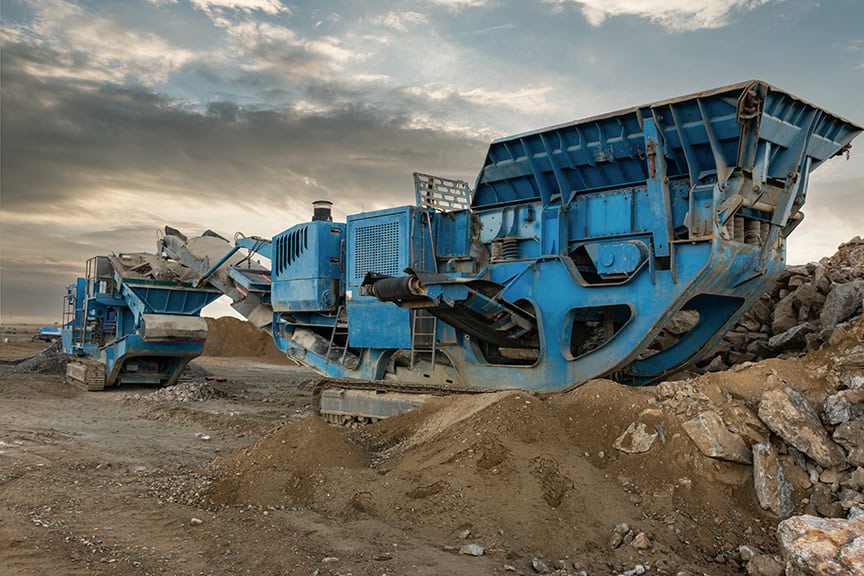
Trend #1: Impact-Resistant Materials
Resistant wear coatings are designed to protect surfaces from severe mechanical stresses like blows, strikes, and collisions. These coatings are essential in industries where equipment and components meet harsh operational conditions. For example, the mining industry has traditionally focused on materials designed to resist sliding abrasion from elements like sand, rock, and slurry.
The demand for high-impact resistant-wear materials is rising. Coatings ranging from ceramic to polyurethane to epoxy all provide durability and absorb shocks effectively. The next generation of solutions will become even more versatile to mitigate wear and prolong equipment life.
At Copps, we’re actively developing a new generation of high-impact-resistant materials. As customer needs for these types of materials emerge, we’ll be positioned to respond with formulations in our product lineup.
Trend #2: High Temperature-Resistant Materials
The mining industry is experiencing a significant shift with the discovery of vast lithium reserves in northern Mexico. The extraction and processing of this valuable resource demand materials that can withstand exceptionally high temperatures. Existing solutions can handle temperatures up to 450°F, but with the unique requirements of lithium processing, even greater strength and durability will be needed.
Copps Industries is braced for the challenge, actively researching and developing materials designed to perform under these extreme conditions. Our team of experienced chemists played a pivotal role in developing our existing high-temperature materials, and we’re pushing the boundaries of what’s possible to accommodate increasing needs. The key lies in enhancing our epoxy binders, which form the backbone of these high-performance materials.
Trend #3: Speed in Low-Temperature Environments
Efficiency is critical across every industry, and that means the speed with which materials cure and set is a top concern for many. Most materials today do best in ambient temperatures ranging from 60˚F to 120˚F. In colder climates, these materials might not perform optimally.
In regions like South America, with higher elevations and where temperatures can drop to 40°F, there’s a pressing need for materials that cure quickly. Customers in this region have told us most of the solutions in the marketplace today simply aren’t satisfactory under their working conditions. Copps Industries is collaborating closely with them to develop innovative solutions that cure faster at low temperatures, reducing equipment downtime and increasing productivity.

Copps Industries: A Partner for Innovation
At Copps, we’re not just following trends; we are anticipating and shaping them. Our ongoing product development is a testament to our proactive approach. Our innovation in impact-resistant, high-temperature, and quick-setting materials at low temperatures is delivering top performance and advancing industry standards.
Our promise to our customers is clear: Copps Industries is your partner in navigating the complex landscape of wear-resistant materials. We’re committed to equipping you with the best products to face the challenges of today and tomorrow. Contact us to learn more.
In the search for industrial products, too many organizations settle for a low standard. You might browse a catalog and order what’s available, even though it has features and properties you don’t really need or requires processes that delay your production. The price is acceptable, and you trust it will arrive on time.

But there’s a better choice: a custom solution formulated specifically to optimize your success.
At Copps Industries, customization isn’t just an option; it’s our preferred path to help you harness precision, efficiency, and cost savings. Here, we’re diving into our approach to customizing unique formulations and addressing the most common objections we hear to demonstrate why a custom solution is crucial to your success.
Understanding Customization
There’s a common misconception that custom solutions are more expensive and come with longer lead times than off-the-shelf products. And that’s often the case when you contract with other suppliers. Not at Copps Industries.
We’ve noticed that many customers aren’t aware that tailoring a solution to their specific needs is an option, let alone an affordable one. The usual instinct is to opt for standard products because they seem more accessible and can be fulfilled immediately. But what if the standard solution isn’t the perfect fit for your unique requirements?
Our Customization Process: Designed for You
At Copps Industries, our goal is to adapt our product to your process, not the other way around. We start by understanding what you want to achieve and examining what is and is not working with your current formulations. Then, we collaborate to create a formulation specifically designed to meet your needs—at no additional cost.
We don’t believe in charging more just because a solution is customized. We aim to understand your processes and develop an ideal formula for your processes while considering your cost targets.
Achieving Efficiency & Savings
Sometimes, concerns about availability and shipping delays come up in conversations about custom solutions. We’re transparent in addressing these questions head-on. If the necessary raw materials are available, your lead times remain unchanged. If your custom formulation requires unique raw materials, procuring them may extend the development phase. However, once development is complete, production and shipping will resume normal lead times without delays.
When considering costs, you might assume a custom solution comes with a high price tag. In cases where special materials are required, the initial cost may be higher. However, a tailor-made solution can result in significant savings in your manufacturing processes with increased throughput.
We have extensive experience developing products to create efficiency and reduce costs without compromising on quality or efficiency. One customer was using an aerospace-grade product primarily for its heat resistance despite having no need for many of its other properties. Working together, we developed a custom solution that focused on exactly what they needed and removed unnecessary properties. The resulting formulation met their specific needs, reduced their costs, and simplified their process—it eliminated the need for them to cure in specialized ovens, leading to huge operational savings.
Collaboration Over Compromise
We believe in collaboration over compromise. You tell us what you need to improve your process, and we work together to make it happen. This personalized process ensures a one-of-a-kind solution adapted to your needs.
Unlike many others in the industry, our threshold for customization is reasonable, meaning we can provide tailored solutions without the usual barriers, like extended lead times. Our capacity to develop and supply custom products quickly and efficiently is at the core of our approach.
The Virtual Copps’ Chemist is more than just a service—it’s a testament to our commitment to your success. As a catalyst for collaboration, the Virtual Chemist allows you to harness our expertise, secure top-quality products, and gain a partner dedicated to moving your business forward.
Go Beyond Standard Solutions with Copps Industries
Choosing a custom solution with Copps Industries means investing in your success at a cost comparable to, or even less than, standard options. Our formulations are designed to seamlessly integrate with and enhance your operations. We ensure you get exactly what you need without paying for what you don’t.
Why settle for the standard when you can optimize your output and secure your success with customization? We supply custom solutions on an everyday basis at Copps. Contact us today to learn more about Copps Industries and get started collaborating on a custom solution.
From high-speed race cars to cutting-edge aircraft, epoxy resin and carbon fiber are the secret ingredients powering innovation across industries. In applications where every ounce counts and resilience is non-negotiable, carbon fiber reinforced with epoxy resin is the go-to choice.
Let’s explore how this perfect match redefines what’s possible in strength and durability.
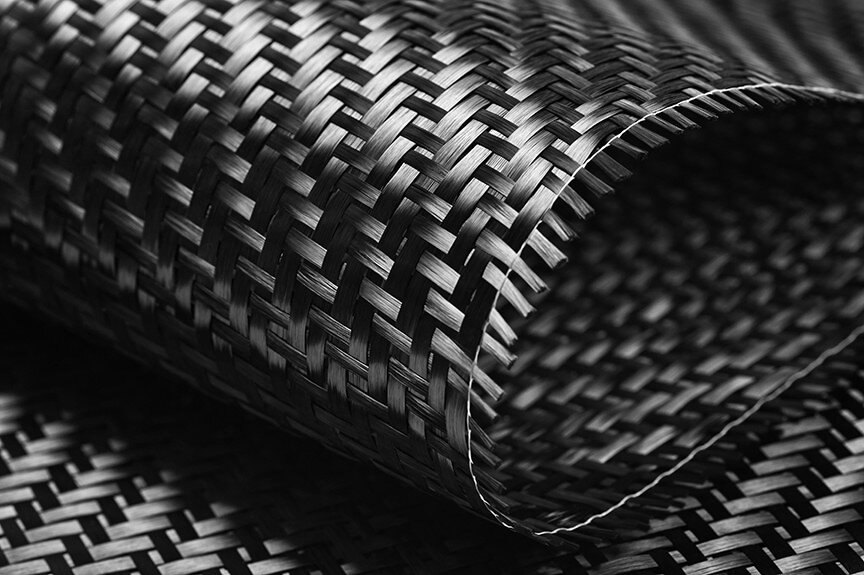
Epoxy Resins for Carbon Fiber
Composites are specialty materials made from a combination of fibers and resins. Epoxy resin is a thermoset polymer material that is heated and cured to chemically alter the material’s composition to create a permanently hardened substance. Epoxy resins can have glass transition temperatures above 400F˚, allowing them to retain their physical properties in high-temperature ranges. Once the liquid polymers in an epoxy resin solidify, the hardened piece becomes strong, resistant to chemical and thermal damage, and can withstand physical wear or impact.
Epoxy resin is advantageous due to its properties in its cured state. The material has the unique ability to fuse with carbon fibers to create an even stronger microstructure that showcases the advantages of both the epoxy and the fibers.
Carbon fibers are strong, lightweight, and fatigue-resistant fibers used to build composite materials. By combining carbon fibers with epoxies, manufacturers can create incredibly hard, durable materials that outperform both individual material types. Composites are a relatively new production material compared to materials like aluminum, iron, and steel, but there are many benefits to working with carbon fiber-strengthened composites that span a range of industries.
Carbon fibers resist fatigue, have low thermal expansion, and absorb or dampen vibrations. They are supplied in two forms that are suitable for creating composites. Carbon fiber tows are bundles of thousands of untwisted, continuous fibers that can be used directly in epoxies or converted into woven reinforcement materials like fabrics or tape.

Benefits of Epoxy Resins for Carbon Fiber
Epoxy resin and carbon fiber composites are uniquely strong and offer excellent performance in commercial and industrial applications. Some of the benefits of this material include:
- Strength: Carbon fibers have high tensile strength but are prone to damage. Epoxy resins have low tensile strength, but their toughness and malleable properties protect the fibers from damage, creating an even stronger material.
- Lightweight: The composite material has an excellent strength-to-weight ratio, surpassing even aluminum and titanium. As a result, manufacturers can produce lightweight parts that can be used in more energy-efficient vehicles and assemblies.
- Flexibility: Despite its strength and durability, the composite is simultaneously very flexible. This means the material can withstand strong impact forces by absorbing the force. It also won’t develop spider cracks under impact or when the material is bent.
- No shrinkage: Epoxy resins won’t shrink after curing. This extends the lifespan of composite parts and components used in harsh environments.
- UV resistance: The composite material can withstand exposure to sunlight. It’s 100% UV resistant, so it can be used in long-term outdoor applications without the risk of wear or degradation.
- Aesthetics: Epoxy resin and carbon fiber composites are transparent, which makes them an excellent choice for visible components and consumer-facing products.
Applications of Epoxy Resins with Carbon Fiber
The versatility of epoxy resin and carbon fiber composites makes them useful in a wide variety of applications and industries. At Copps Industries, we formulate epoxy resins for composite materials used across the following applications:
- Aerospace
- Aircraft and avionics
- Automotive component construction and assembly
- Boats and marine applications
- Consumer goods
- Construction
- Corrosion-resistant parts for industrial and manufacturing equipment
- Military and defense—DoT-approved epoxy resin systems
- Oil and gas processing
- Sporting goods and recreational products
- Transportation
Choose Epoxy Resins with Carbon Fiber From Copps Industries
Since 1979, Copps Industries has been a leading provider of high-performance epoxy resins for use in civil engineering, adhesives, manufacturing, and more. Our company is ISO 9011:2015-certified as part of our commitment to excellent product quality. We produce resins for use in a wide variety of composite materials.
If you’re ready to elevate your projects with the strength and resilience of carbon fiber and epoxy resins, contact us today to request a quote and start your order.
As a professional society dedicated to providing information and resources, the Society for the Advancement of Material and Process Engineering (SAMPE) is a valuable network for scientists, engineers, and researchers. The SAMPE Annual Conference and Exhibition brings together professionals from around the world to explore the latest advancements in materials and processing technology.
Copps Industries is excited to have participated in the SAMPE Annual Conference and Exhibition 2024, held in Long Beach, California, May 20-23. Featuring a variety of speakers, technical papers, educational sessions, and an expansive expo, the event is a place where groundbreaking ideas are exchanged. Here, we’re sharing some of the highlights and key takeaways from this year’s conference.
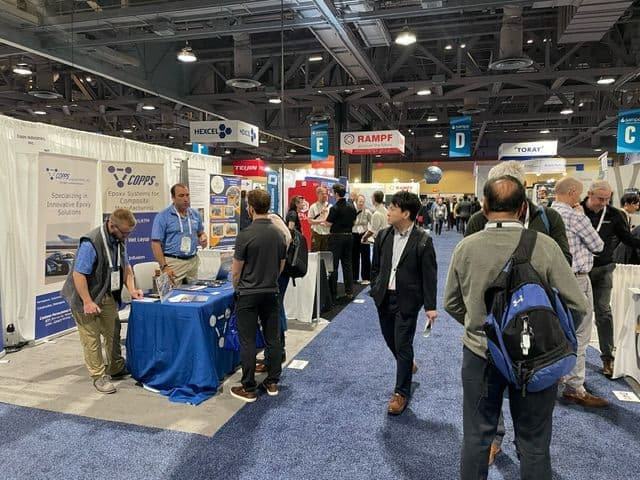
Keynote Address: Empowering the Materials and Process Community
An inspirational session at the conference was the keynote address, “Empowering the Materials and Process Community for Tomorrow’s Innovations,” by Stephen Heinz from the Composite Materials Division at Syensqo. Heinz discussed how industries reliant on composite materials have faced rapid disruption with the evolution of advanced air mobility and advances in technologies. He emphasized the need for materials and process professionals to innovate at the same pace to continue to advance the industry.
Themes of Advancement and Sustainability
The conference featured several sessions and panels reflecting key themes of advancement and sustainability. Some of those sessions included:
- Advancing Composite Materials Technology, which emphasized the importance of collaboration between academia and industry to drive innovation in composite materials and prepare the next generation of engineers to continue this progress.
- Sustainability and Circularity in the Advanced Materials Industry, which explored strategies for sustainability in the production and use of advanced materials and shared insights to help businesses integrate sustainable practices into their operations and product life cycles.
- Sustainability and Applications of Advanced Materials, which looked at the various applications that contribute to sustainability, from lightweight composites that reduce fuel consumption to materials designed for renewable energy systems.
Another standout session was “Doing Business in Mexico,” where Dr. Yadira Gochi-Ponce highlighted Mexico’s leadership in advancing multifunctional materials and the country’s significant aerospace manufacturing contributions.
USDOE & SAMPE Co-Sponsored Workshop
One of the key conference highlights was a workshop on Advanced Materials for Hydrogen Infrastructure Technologies, co-sponsored by the U.S. Department of Energy (USDOE) and SAMPE. The workshop examined state-of-the-art advanced materials like fiber-reinforced composites. Participants left with a better understanding of current challenges and opportunities and potential strategies to reduce costs and improve performance.
Exhibit and Customer Engagement
The exhibition floor bustled with manufacturers and suppliers showcasing their latest products and innovations, offering organizations the opportunity to engage face-to-face with potential customers and partners. For participating companies like ours, the exhibit hall offered valuable opportunities to connect with customers and gain insights into market demands and emerging trends.
Connecting to Copps Industries Values
Copps Industries emphasizes many of the same themes highlighted at the SAMPE 2024 Annual Conference as part of our ongoing commitment to innovation and sustainability. This includes our dedication to advancing materials technology and exploring sustainable solutions for our customers and the community.
The SAMPE conference provided a platform for industry professionals to exchange ideas, explore innovations, and foster connections. From an inspiring keynote to engaging sessions on sustainability and advanced materials, the event showcased how the engineering community is addressing some of today’s most pressing challenges. At Copps Industries, our commitment to sustainability and cutting-edge innovation ensures we continue to meet the evolving needs of our customers in the materials industry.
When it comes to composite manufacturing, you can choose from many materials and methods, each with unique advantages. Among the choices, two techniques stand out: the dry process and pre-impregnated (or pre-preg) process. Understanding the differences between the two will help you settle on the most effective way to bring your project to life.
Here, we’re comparing the dry process versus pre-preg to shed light on their characteristics and applications. From cost efficiency to customization to performance, you’ll learn that the dry process is often the best composite epoxy solution.
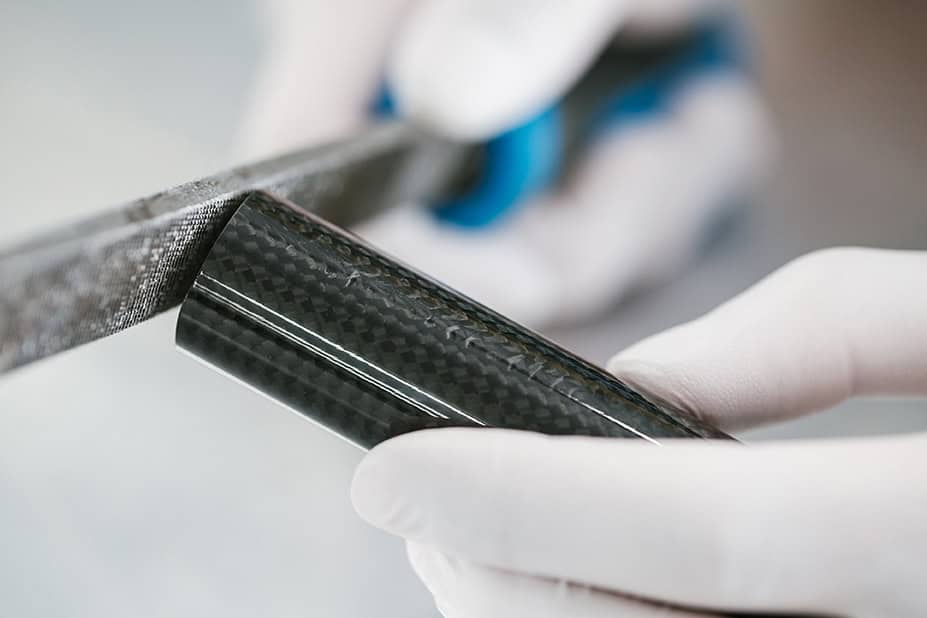
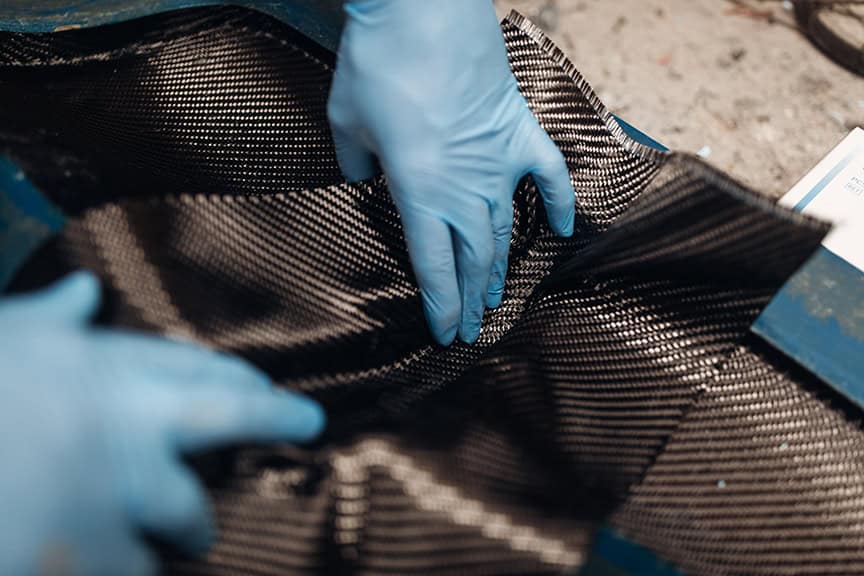
What’s the difference? Dry Process vs. Pre-preg Solutions.
Dry process and pre-preg solutions are two common methods for applying epoxy resin to fabric substrates. Each method comes with its own characteristics and applications.
Dry Process
In the dry process, a raw carbon fiber tow or fabric is loaded into a mold and epoxy resin is used to saturate the substrate. The resin then cures, bonding the fibers together to create a solid composite structure.
Characteristics
- Requires separate handling and application of resin and dry fibers
- Offers flexibility and customization in material selection and layup techniques
- Can reduce material waste and enhance performance
- More cost-effective and compatible with automation compared to pre-preg solutions
Pre-preg Solutions
Pre-preg refers to a composite material where reinforcing fibers are pre-impregnated with a resin before use. This pre-impregnation is typically done by the manufacturer, who applies a precise amount of resin onto the fibers and then cures them to a partially cured state. The pre-preg materials are then stored in a freezer until they are ready to be used. When heated, the resin cures, bonding the fibers together to create a solid composite structure.
- Characteristics:
- Reinforcing fibers are already impregnated with resin, simplifying handling and processing
- Requires freezer storage to prevent premature curing
- Offers consistency in material properties and performance
- Typically more expensive than the dry process due to additional processing and handling
Both dry process and pre-preg solutions have their advantages, and the choice between them depends on cost, production volume, and performance specifications. The dry process offers several benefits that make it the best choice for most applications:
The dry process involves lower material costs compared to pre-preg solutions. Pre-preg materials are often more expensive due to additional processing and handling.
The dry process allows for easier and faster customization and flexibility in material and techniques. You can tailor the resin type, fiber orientation, and layering technique to meet specific requirements and optimize the finished product.
With pre-preg solutions, unused or excess material can lead to waste due to limited shelf life, resin wasted in pattern cuts, and storage requirements. In dry processing, the fibers and resin are combined in the mold as needed, which reduces waste and limits your environmental impact.
- Improved Handling and Storage:
Dry materials are easier to handle and store than pre-preg solutions, which require storage in freezers. This simplifies logistics and reduces the risk of material degradation during transportation or storage.
Pre-preg solutions require additional processing steps and curing time, while dry processing offers faster cycle times and increased efficiency. The dry process allows you to streamline production without compromising quality.
Copps Industries Composite Epoxy Solutions
If you want to streamline your production processes, enhance product performance, and reduce costs, consider dry processing as the ideal composite epoxy solution. From cost-effectiveness and customization to enhanced performance, it offers benefits across a range of applications.
Copps Industries offers a range of standard and custom epoxy resin systems designed to meet your needs. Whether you need assistance with formulation selection or a solution tailored specifically to your project, we’re here to help. Contact us to place your order or request a quote.
When it comes to your business, the right partners can mean the difference between stagnation and success. But when faced with making a choice, distinguishing between a transactional supplier relationship and a transformational partnership can be a challenge.
At Copps Industries, we understand the pivotal role of partnership in delivering long-term value. With a mindset of mutual success, we strive to redefine manufacturer-supplier collaboration. We believe that beyond providing high-quality products, the right partner should offer transparency, fill knowledge gaps with their expertise, and provide proactive support.

We’re breaking down five critical questions to ask when you’re evaluating potential supplier partnerships.
1. How do you approach product development?
When assessing a potential partner, it’s important to understand their approach to product development. Are they focused on pushing the products already in their portfolio, or are they willing to tailor solutions to your specific needs and requirements?
At Copps Industries, we pride ourselves on a solutions-oriented approach, working closely with our customers to develop customized solutions that deliver real value. Plus, we continually push for improvement and innovation by refining existing formulations and venturing into uncharted territories.
2. What level of involvement can we expect from your technical experts?
Access to technical expertise can be a game-changer when it comes to coping with complex challenges. Does your prospective partner have experts on staff who can fill knowledge gaps and provide insights? Are they available to you?
Copps Industries offers easy access to a diverse team of technical experts dedicated to empowering your success. And with the Virtual Copps’ Chemist, you get to harness our expertise in every aspect of product development, use, and delivery.
3. How do you handle situations where a solution is not immediately apparent?
In the face of uncertainty or ambiguity, a supplier should be able to adapt. Does your potential partner demonstrate a willingness to experiment, test hypotheses, and collaborate to find the right solution?
Copps Industries collaborates with customers, leveraging our collective expertise and resources to overcome any obstacle that appears in our path. We’re not deterred by a challenge; we thrive on working relentlessly for a solution.
4. How do you ensure the formulas provided meet our expectations?
Trust is the cornerstone of any good partnership. Does it appear you can rely on your partner to deliver formulas that meet your needs in terms of quality and performance? Or are they simply serving up the cheapest solution?
We set the standard for quality, working alongside our customers to pave the way for performance and reliability. You can depend on Copps Industries to deliver products that exceed your expectations.
5. What measures do you take to maintain confidentiality and protect our brand?
In today’s competitive landscape, confidentiality is non-negotiable when you’re seeking a private label supplier. Your partner should be committed to safeguarding your brand and protecting your reputation.
At Copps Industries, we supply both private label as well as direct to the industry. No matter how we partner with you, our mindset of mutual success means we become an extension of your team. We work with respect and discretion, taking every measure to work with integrity and maintain the confidentiality of your custom solutions.

Assessing Supplier Responses
As you evaluate potential partners, pay close attention to their responses to these questions. Here are three red flags to watch out for when assessing supplier responses:
- Lack of Transparency: If a supplier is vague in their responses, it may indicate a lack of transparency or a reluctance to engage in open communication. Beware of partners who won’t speak openly about their capabilities and processes or how they work through potential challenges.
- Limited Technical Expertise: A supplier who offers limited access to technical experts or is unwilling to share their expertise may not be equipped to provide the level of support you need. Make sure your partner is committed to providing help at every turn.
- Inflexibility: Partners who resist experimentation, testing, or exploring new solutions may hinder your ability to adapt and innovate. Look for signs of flexibility, openness to new ideas, and a willingness to collaborate on solutions that drive mutual success.
When you watch for these red flags, you can better assess the fit of potential suppliers and identify the right partner who will be invested in your success. Choose a supplier who listens to your needs, freely shares expertise, and demonstrates collaboration. Steer clear of those who signal they’ll operate on their own agenda.
Partnership is Paramount at Copps Industries
Selecting a supplier can be challenging. But with the right approach, choosing a partner can become a catalyst for growth and innovation. Prioritize partnerships built on trust, expertise, and shared success. As you make your assessment, remember that Copps Industries is dedicated to your success at every stage of your journey. Contact us today to learn more about Copps Industries and get started collaborating on a custom solution.
Stronger yet lighter weight. More flexible yet more durable. Thermally insulated. Versatile. And chemical or corrosion-resistant on top of it all. If the part or component you need must be some, all, or even more of these, your best solution is an epoxy composite.
If you need it fast and done to your exacting standards, the only solution is to partner with Copps.
Here, collaboration with our customers is king. Short lead times and fast turnarounds are to be expected. And access to our entire team, from service to formulation, to support after you have what you need – is guaranteed.
And because we service a wide range of markets outside of the epoxy composites world, we’re able to connect you with different expert perspectives and new ideas. The kind other sources simply can’t provide.
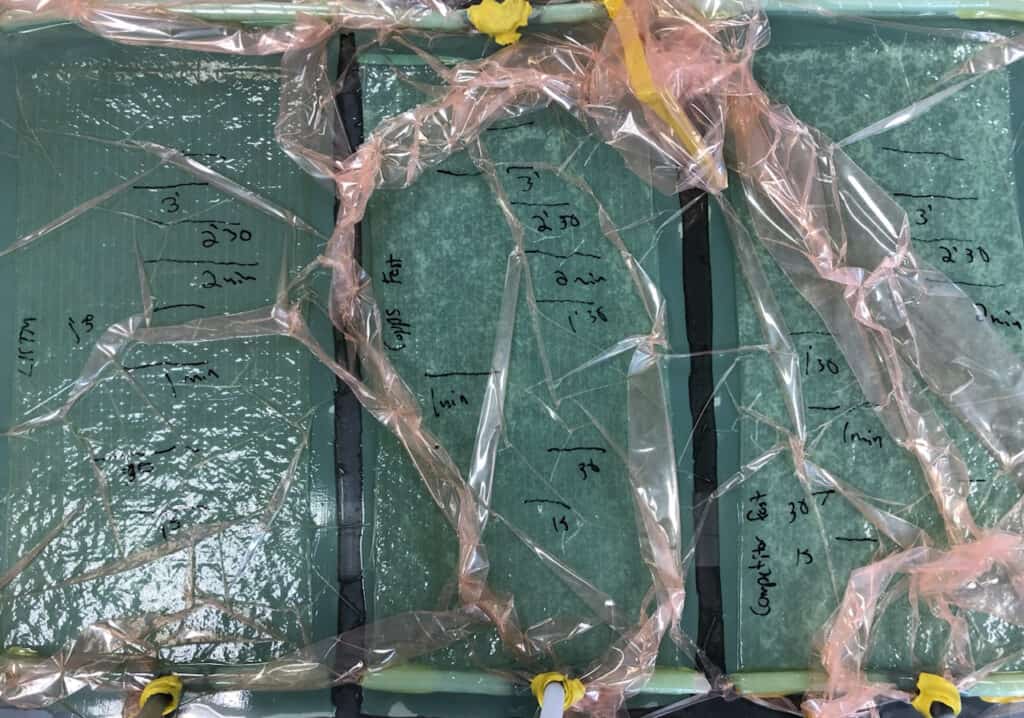
Reinforcements: Putting it All Together
Your job, your product, your needs are unique. What’s not unique is the fact that epoxy resin alone typically doesn’t provide enough structural integrity to meet the reliability and durability you need.
We cater our epoxy development to create a low-density material with a high strength-to-weight ratio to meet the needs of diverse applications specifically with each of these types of reinforcements:
- Carbon fiber
- Fiberglass
- Aramid
- Natural fibers: jute, flax, and kenaf
- Exotic fibers: boron, basalt
- Particulate fillers: ceramic, silica, metal
Properties and Advantages of Different Reinforcements
Each reinforcement material offers its own unique characteristics and benefits. The best material for your specific application depends on its intended use. Some of the most common properties reinforcements offer include:
- Impact resistance
- Stiffness
- High strength-to-weight ratio
Not Just a Manufacturing Process. Your Process.
For every type of process, there’s a set of variables that come into play – as well as the desired outcome. That’s why we develop products not just for the process type, but for the individual customer variation within each process type. That’s what makes Copps unique.
Through customer collaboration, meticulous attention to detail and precision, we develop products for all of these processes:
- Vacuum Bagging: An open molding technique (including Wet Bagging) that places mechanical pressure on a laminate during its cure cycle. Designed to achieve higher-than-normal properties of Hand Layup without the technical challenges of VIP.
- Hand Layup: The simplest composite molding method available where fiber reinforcements are wet out by hand and manually positioned into a mold.
- High-Pressure Resin Transfer Molding (HPRTM): Rapidly becoming popular in the automotive, industrial, and agricultural industries, this is a high-output process where dry reinforcement fabrics are placed into metal tooling inside of a high-tonnage hydraulic press. Resin is then injected under very high pressures for precise part geometry and repeatability. It can also be automated in a 5-step process.
- Light Resin Transfer Molding (LRTM): A closed-mold process similar to resin transfer molding where both the A and B molds are made of composites. This technology is frequently applied in production of boats and water equipment but has infinite possibilities beyond, including car body elements, trailers, aircraft, and more.
- Vacuum Assisted Resin Transfer Molding Process (VTRM): Another variation of RTM, this too is a closed-mold manufacturing process. Unlike LRTM, the top portion of a mold tool is replaced with a flexible vacuum bag, and vacuum only, no injection, is used to assist in resin flow. Currently most used in composite production where only one part of the laminate is visible.
- Vacuum Infusion Process (VIP): A low production-level, closed-mold process with a single-sided tool that is loaded with dry fabrics. A flexible film is then used to apply full vacuum to the part and the resin is drawn into the reinforcement through the vacuum applied. Popular infusion resin types include epoxy, polyester, and vinyl ester.
- Filament Winding: The process of winding resin-impregnated strands of fiber around a rotating mandrel to create a composite structure. Creates high-fiber loading with good directional strength for extremely strong composite products.
- Pultrusion: A high throughput process for making straight solid shapes where dry fibers are dipped in resin and pulled through a heated metal die creating the part profile and curing in one step. Best suited for high-volume, single-direction reinforced products like rods, poles, trim, flat panels, and more.
Regardless of the method to suit your process, our quality control and testing are vital to ensure the final product will meet the required standards.

Markets Served by Our Epoxy Composites
Where in the real world will you find epoxy composite solutions from Copps?
Virtually anywhere. By land, sea, and air (even above and beyond) Epoxy composites are used throughout nearly every industry.
In the automotive sector, they help create vehicle parts for increased performance and weight reduction. Composites can be used to form structural components in the construction industry. The marine industry relies on them to manufacture boat hulls, decks, consoles, and hatches. In aerospace, they’re a popular choice for aircraft components thanks to their lightweight nature and strength. Here are just some of the markets we’re currently serving:
- Aerospace
- Marine
- Construction
- DoD
- Industrial
- Motorsport
- Automotive
- Sports & Leisure
Exceeding Your Epoxy Composite Expectations
If you have an epoxy composite need or challenge, call on Copps Industries. We’ll create a solution you can have confidence in. Performance and reliability can’t be topped by the day-in and day-out experience you’ll have working with our team of experts. When you’re ready to get started on your next, best composite, contact us today.
In an environment marked by constant change, many businesses grapple with ever-shifting market dynamics, technology, and rules and regulations. Keeping pace demands expertise beyond the reach of most—no one organization has all the knowledge and resources to navigate this terrain alone. That’s why it’s so important to seek out partners who complement your capabilities and are deeply invested in your success.
Enter Copps Industries’ Virtual Chemist, a concept that redefines manufacturer-supplier collaboration. Here, we’re exploring what the Virtual Chemist is and how this innovative resource can benefit you.

The Virtual Chemist Concept
The origin of the Virtual Copps’ Chemist lies in our commitment to customer success. From the start, we recognized that most manufacturers don’t have the technical expertise to specify their formulations. You might know what you want but not necessarily how to get there. That’s where our knowledgeable team steps in to lend their insights. Since 1979, we’ve been developing custom formulations that fit a wide range of customer needs.
To picture the Virtual Chemist in practice, imagine this scenario: a customer might approach us with an inquiry about how a specific formulation would endure the extreme conditions of the African desert. While we may not have experienced this particular climate, we are confident in the product’s resilience in scorching Arizona temperatures. So, we work from there and collaborate to arrive at a solution.
This is the essence of the Virtual Chemist. Rather than succumbing to uncertainty, we leverage the collective expertise between our team and our customers. Together, we explore and innovate, pooling our resources and knowledge to address the challenge at hand.
There are countless other scenarios where the Virtual Chemist demonstrates its value. From keeping up with the latest chemical regulations to analyzing shipping requirements, we advise on every aspect of product development, use, and delivery. We also believe that access to these insights shouldn’t require exorbitant fees; it should come bundled with your custom solutions. This approach underscores our attention to your needs and our pursuit to exceed your expectations.

Commitment to Customer Success
Why does the Virtual Chemist concept matter to your success? Because the role of a supplier should transcend simply providing goods. The right partner serves as an ally who offers insights, fills knowledge gaps, and provides proactive support.
Through the Virtual Chemist, Copps Industries:
- Acts as an extension of your team. Our mindset of mutual success means that we work side-by-side with your team. With easy access to our staff and resources, you gain a partner equipped to navigate chemical and technical challenges, shipping intricacies, and evolving rules and regulations.
- Bridges knowledge gaps. We bridge the knowledge gaps our customers and other partners may have by freely sharing our expertise. Through educational initiatives for your sales or tech team, like the Rock Crusher College available to our Aggregate & Mining customers and other knowledge-sharing, market-specific events, we ensure you’re empowered with information and insights.
- Provides proactive support. We offer proactive support by staying ahead of market trends and regulation changes. This approach can transform your supplier relationship into a collaborative partnership that ensures you remain competitive and compliant.
Partnering with Copps Industries allows you to unlock the power of the Virtual Chemist at no additional cost. It’s all about recognizing that your supplier relationship is more than just transactional; it’s a strategic aspect of your success.
Partnership is Paramount at Copps Industries
The Virtual Copps’ Chemist is more than just a service—it’s a testament to our commitment to customer success. As a catalyst for collaboration, the Virtual Chemist allows you to harness our expertise, secure top-quality products, and gain a partner dedicated to moving your business forward.
As you assess your supplier relationships, look beyond the surface and evaluate the full spectrum of support they provide. The right partner makes all the difference as you navigate an increasingly challenging landscape. To learn more about Copps Industries and get started collaborating on a custom solution contact us today.




















